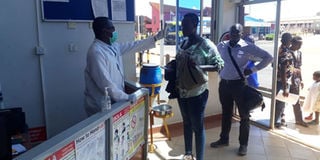Kenya to screen for Ebola after Uganda outbreak

Travellers are screened for the Ebola virus before getting into Kenya at the Busia One Stop Border Post on June 12, 2019. Kenya will start screening truck drivers, bush meat handlers, healthcare workers and travellers for Ebola disease, the Ministry of Health has announced.
What you need to know:
- Given that Kenya and Uganda share borders, CS Kagwe pointed out the need for Kenyans to remain vigilant and report any suspicious cases.
- However, a spot check at the Busia common border revealed no screening.
- Traders from the two countries were crossing the borders freely, even as residents feared the disease would spread to Kenya.
Kenya will start screening truck drivers, bush meat handlers, healthcare workers and travellers for Ebola disease, the Ministry of Health has announced.
In a statement, Health Cabinet Secretary Mutahi Kagwe said counties that share borders with affected countries have been advised to sensitise their residents and healthcare workers to enable them to identify Ebola cases, institute prevention measures and gain proficiency in the case and sample management.
“Mobilise all the relevant stakeholders to initiate prevention, preparedness and response measures,” the CS said.
Given that Kenya and Uganda share borders, he pointed out the need for Kenyans to remain vigilant and report any suspicious cases.
“Uganda has reported Ebola outbreaks in the past, largely influenced by outbreaks in the Democratic Republic of the Congo. It is important to note that there is substantial human traffic between Uganda and Kenya for trade and other socioeconomic activities,” Mr Kagwe said.
“The main form of transport between the two countries is Lake Victoria, with the airport connection. All these put Kenya at high risk of disease importation and, therefore, we need to be vigilant and report any case,” said Mr Kagwe, adding that the ministry will train health officers and send them to all the entry points. Suspected cases are to be quarantined and samples collected for testing.
Spot check
However, a spot check at the Busia common border revealed no screening.
Traders from the two countries were crossing the borders freely, even as residents feared the disease would spread to Kenya.
Mr Victor Okoa, a boda boda operator, acknowledged that he might be putting his life in danger as he transports passengers across the border.
“The government seems to be beefing up protection measures at the one-stop border point ... We want them to set up screening booths here as well,” he said.
Mr Robert Simiyu said market days are likely to fuel interactions.
“The disease is spread through human interaction. We have market days on Mondays and Thursdays. If no strict measures are taken, then we might be at risk,” he said.
Although Kenya has never had a confirmed case of Ebola, it has a national preparedness and response contingency plan.




